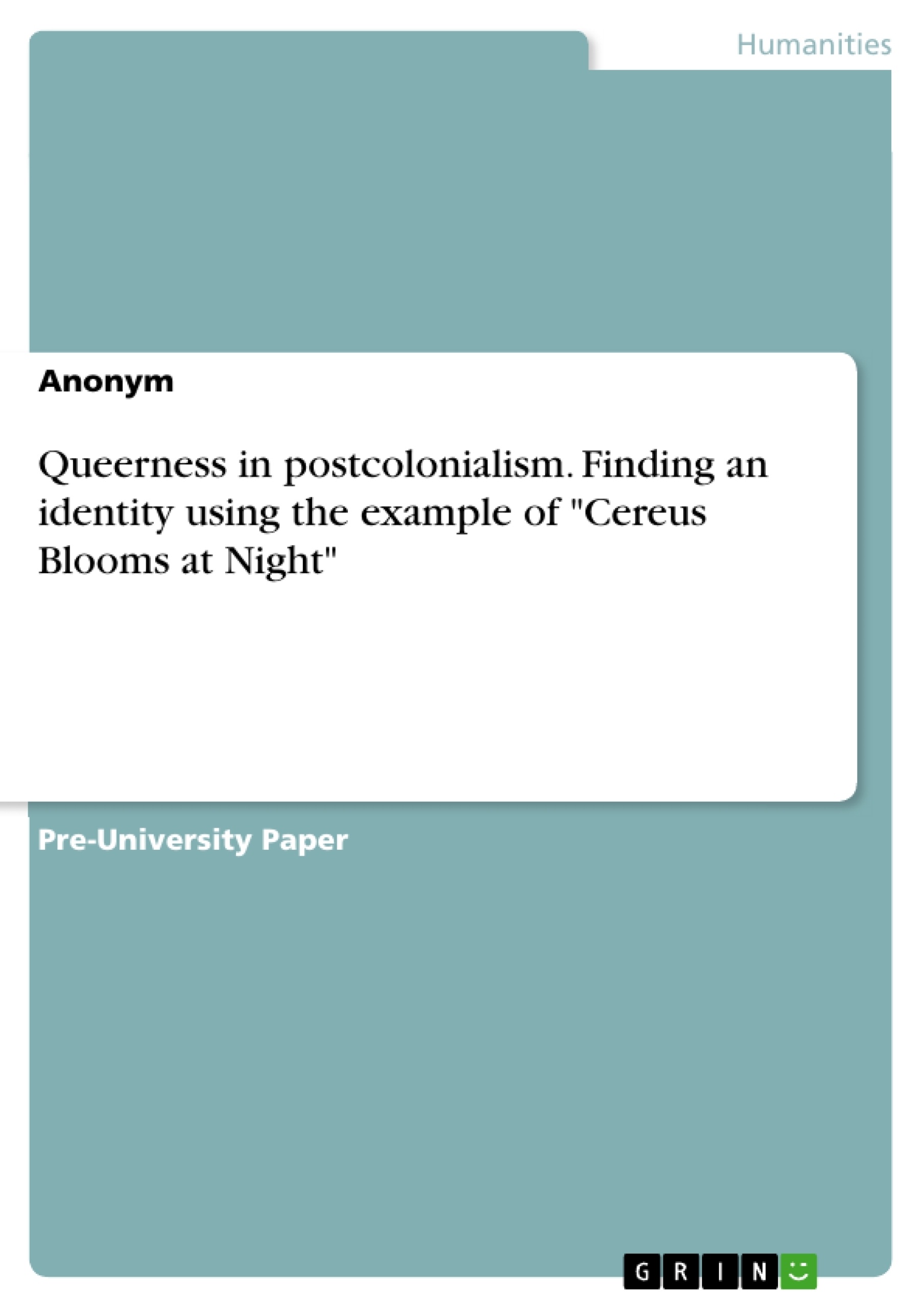This seminar paper seeks to answer the question to what extent and in which ways members of the queer community in postcolonial societies can build an identity using the example of Cereus Blooms at Night in order to illustrate the impact that discrimination and injustice can have on the self-esteem and behaviour of individuals.
It will be based upon the influence of British foreign rule with its values and standards on the attitude of indigenous people towards non-heteronormative sexual engagements in order to explain how the current situation has come about. In addition to that, the theory of “Subalternity” by Gayatri Spivak will be incorporated for it shall contribute to the analysis of the queer’s trapped position. Two major parallels between the Indian woman - for whom this concept has originally been created - and the queer Caribbean will be carved out: Loss of the indigenous language resulting in the inability to voice one’s struggle and the double oppression through both foreign influence and indigenous realities. Concluding the historical background for the scene in which Shani Mootoo’s novel Cereus Blooms at Night is set will be a paragraph about the conflict of current western attempts to influence the situation for the LGBT+ community in the Caribbean.
Table of Contents
- 1. Introduction.
- 2. Queerness in postcolonialism: Finding an identity in Cereus Blooms at Night
- 2.1. Historical Background.
- 2.1.1. British attitude towards queerness during the time of colonialism and its influence on the Caribbean natives
- 2.1.2. Gender roles and the mati practice: A picture of the indigenous Caribbean attitude towards same-sex relationships
- 2.2. Spivak's theory of Subalternity applied to the question of sexual and gender identity in the postcolonial Caribbean
- 2.3. Shani Mootoo: Cereus Blooms at Night.
- 2.3.1. Characters
- 2.3.2. Methods of discriminating against members of the queer community experienced by Tyler
- 2.3.3. Ways to deal with the experienced injustice as shown by characters from Cereus Blooms at Night.
- 3. Conclusion
- 4. Works Cited
- 5. List of illustrations
Objectives and Key Themes
This seminar paper aims to investigate the ways in which members of the queer community in postcolonial societies can build an identity, particularly focusing on the novel "Cereus Blooms at Night" by Shani Mootoo. The paper will examine the impact of discrimination and injustice on the self-esteem and behavior of individuals within the queer community in a postcolonial context.
- The influence of British colonial rule and its impact on indigenous attitudes towards queerness in the Caribbean.
- The application of Gayatri Spivak's theory of Subalternity to understand the challenges faced by queer individuals in the postcolonial Caribbean.
- The exploration of different forms of discrimination and oppression experienced by queer characters in "Cereus Blooms at Night".
- An analysis of coping mechanisms and strategies employed by characters in the novel to navigate societal prejudice.
- The interconnectedness of colonial history and present-day problems faced by the queer community.
Chapter Summaries
The introduction sets the stage by discussing the struggle for queer identity and acceptance, particularly in formerly colonized countries. It outlines the seminar paper's objective to examine how members of the queer community in postcolonial societies can build an identity using the example of "Cereus Blooms at Night".
The historical background section delves into the evolution of attitudes towards queerness in Britain during the 19th century, highlighting the influence of Christianity and social norms on the perception of homosexuality. It then examines the impact of British colonialism on the Caribbean, emphasizing the imposition of Victorian morals and the criminalization of same-sex relationships through laws such as the "Offences Against The Person Act".
The chapter on Spivak's theory of Subalternity discusses how the theory can be applied to the queer experience in the postcolonial Caribbean. It draws parallels between the experiences of Indian women and the queer Caribbean community, highlighting the loss of indigenous language and the double oppression resulting from both foreign influence and indigenous realities.
Keywords
Key concepts and themes explored in this paper include queerness, postcolonialism, identity, discrimination, injustice, homophobia, colonialism, subalternity, and the novel "Cereus Blooms at Night" by Shani Mootoo.
Frequently Asked Questions
What is the main focus of "Cereus Blooms at Night" regarding identity?
The novel explores how members of the queer community in postcolonial societies build an identity despite discrimination and colonial legacies.
How did British colonial rule affect Caribbean attitudes toward queerness?
British rule imposed Victorian morals and laws (like the Offences Against The Person Act) that criminalized same-sex relationships and suppressed indigenous attitudes.
What is Spivak’s theory of "Subalternity"?
Subalternity describes groups excluded from society's power structures. In a queer context, it highlights the inability to voice struggles due to double oppression by foreign and indigenous realities.
What was the "mati practice" in the Caribbean?
The mati practice refers to indigenous Caribbean traditions of same-sex relationships among women, providing a contrast to imposed colonial heteronormativity.
How do characters in the novel deal with injustice?
Characters like Tyler use various coping mechanisms to navigate societal prejudice, seeking spaces where they can express their true gender and sexual identity.
Why is the loss of indigenous language significant for queer identity?
Following Spivak, the loss of language results in the inability of the subaltern to voice their struggle in their own terms, forcing them into the linguistic framework of the oppressor.
- Quote paper
- Anonym (Author), 2019, Queerness in postcolonialism. Finding an identity using the example of "Cereus Blooms at Night", Munich, GRIN Verlag, https://www.hausarbeiten.de/document/536768


